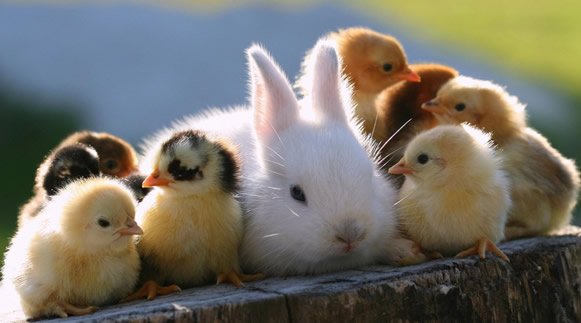It might sound very strange to keep rabbits with chickens, but raising and keeping these animals together can be a joy.
Rabbits may not lay eggs, but there are some similarities that can make keeping them together fun.
On the other side of things, this arrangement will require a little more work from you to keep them happy and healthy.
Chickens and rabbits are delicate and fearful, animals. They need time to get to know each other, and they have different needs.
With time and dedication, keeping chickens and rabbits together can work. All animals are capable of forging unlikely friendships.
Despite this, some ground rules must be observed. Chickens and rabbits will only tolerate each other’s company under certain circumstances:
- Introduce them when young. As both species grow older, they’ll become set in their ways and increasingly intolerant.
- Rabbits must be spayed or neutered: Male rabbits will mount anything in sight. This may be sexual in nature, or it could be an act of domination. Either way, neutering will calm them down.
- Clean environment: Rabbits are cleaner than chickens. They’ll grow distressed if they’re surrounded by filth. It is also a health hazard.
- Space and privacy: They’ll become overwhelmed if they feel they don’t have privacy.
- Sleeping quarters: You may want to include a hutch for your rabbit in the coop. Not only will they feel safer, but they’ll be cleaner. Chickens poop constantly.
- Two of each animal: One chicken and one rabbit will make both of them feel stressed and lonely.
- Behavior: If the relationship starts breaking down, separate the animals at once to avoid aggression.
How to Introduce Rabbits and Chickens?
If you want rabbits and chickens to live in harmony, they must meet each other while young.
Wait until a male rabbit is old enough to be neutered before making the introductions.
Not only will it go some way to curbing amorous instincts, but it calms rabbits down. You can’t just lock them together and tell them to get along.
Use the following step-by-step process:
- Introduce both species on different sides of a fence. Let them get a feel for each other from a distance.
- Allow them to run free together. They may ignore each other at first, but this means they do not feel threatened.
- Let the chickens have the run of the coop and place the rabbits in the run. After a while, reverse these roles. Eventually, the two species will grow used to sharing a space together.
- Watch out for territoriality in the rabbits as they will jealously guard their space. Ensure they understand that the coop is a shared space. Providing a unique, rabbit-only retreat will help with this process.
What Are The Advantages of Chickens and Rabbits Living Together?
There is a range of benefits to keeping chickens and rabbits in the same coop.
These include the following:
- Space-saving: One large coop for all your animals is more space-efficient than each type of animal living in separate homes.
- Company: If you can’t keep your rabbit indoors, chickens will keep them company. You’ll be surprised at how well these animals get along, provided that they’re introduced early enough.
- Security: Chickens and rabbits are prey species, and even attract the same predators. They’ll enjoy more safety in numbers.
- Reduced Smell: Rabbits are clean, but their waste has a pungent aroma. Chickens are less so, so you’ll need to clean the coop regularly. This means that your rabbit will live in more sanitary conditions.
- Temperatures: Rabbits and chickens are hardy and cope well with cool weather. They both flourish in the winter. There’s no need to worry about one species needing more heat than the other.
- Fun: Chickens and rabbits are amusing to watch as they interact.
What Are The Disadvantages of Chickens and Rabbits Living Together?
If we’re to be realistic, chickens and rabbits were not meant to live together. If this were the case, they’d be found in the same wild locations.
Things to think about before forcing these animals to share space include:
- Food. Rabbits and chickens have different nutritional needs. If they eat each other’s meals, they may become sick. You’d need to feed rabbits separately. This is important, as chickens eat anything.
- Temperaments. Rabbits and chickens are as different as apples and oranges. Chickens are afraid of fast-moving animals, which may result in pecking, clawing, and fighting.
- Disease. Between them, rabbits and chickens can be prone to a range of zoonotic diseases. They could also share parasites. One unpleasant outbreak could wipe out your entire animal family.
- Cleanliness. This is both a pro and a con. Rabbits are much cleaner than chickens. This means you’ll need to muck out the coop daily. This reduces the risk of flies and parasites, but it’s hard work.
- Mating. A male rabbit may mount every chick in the coop. Neutering will help, but it may not stop the behavior altogether.
- Coop Materials. Rabbits have delicate skin and may hurt themselves on a wire chicken coop. Use suitable materials for both species.
- Digging. Rabbits love to dig, so you’ll need hard floors to prevent escape. This flooring can be uncomfortable for the chicken’s feet.
Do Rabbits and Chickens Share Diseases?
Usually, these are transmitted from chicken to rabbit. Chicken poop, in particular, is a constant health risk for rabbits.
The other concern is shared parasites. Flea infestations are not common in chickens, but they can occur.
Ticks are less of a concern. These arachnids rarely attach to chickens. In fact, chickens actively eat them.
Can Chickens Give Rabbits Diseases?
Salmonella is a disease that many chickens have, but display no symptoms. This means that the chickens could infect a rabbit without even realizing. Not all rabbits show symptoms of the disease, though.
Of greater concern is the risk of coccidiosis. This disease occurs when a parasite attaches itself to a chicken’s digestive tract. If shared, this disease can be fatal to chickens and rabbits.
Can Rabbits Give Chickens Diseases?
Pasteurellosis in rabbits is better known as snuffles. It’s a bacterial infection of the upper respiratory tract.
Snuffles is contagious between rabbits. It can be life-threatening if the rabbit has a weak immune system.
Pasteurellosis can be a severe concern for chickens as it can lead to fowl cholera. This is frequently fatal.
Vaccination for chickens is available, and advisable, if you wish to keep two different species of animals together.






